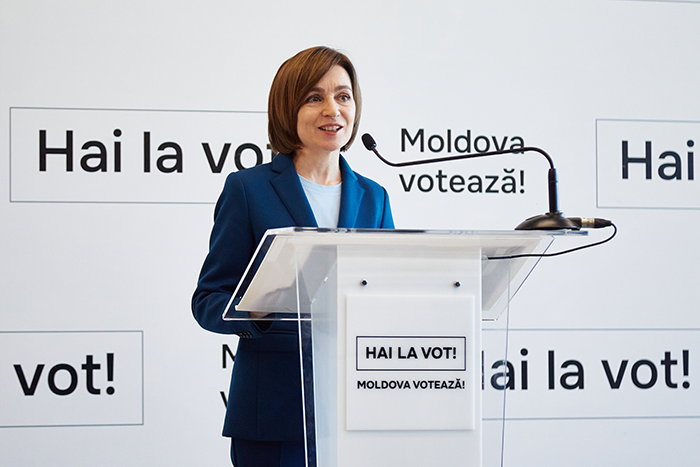Interviews / Europe, European Union, NATO
28 October 2024
Referendum on Moldova’s Accession to the European Union: What Are the Defence Implications?

Moldova, a former Soviet republic landlocked between Romania and Ukraine, held a referendum on October 20 to enshrine the country’s goal of joining the European Union in its Constitution. The “yes” vote narrowly prevailed, reshaping the dynamics for a nation whose historical strategy has been one of caution towards Moscow, tempering its alignment with the West.
What does the outcome of this vote reveal about Moldova’s relations with Europe and Russia? What is its defence strategy in the face of a potential spillover of the war in Ukraine onto its territory? How is it cooperating with its Western partners?
Analysis by Louise Souverbie, researcher at IRIS, specialising in European defence and the arms industry.
At the start of this week, Moldovan voters, by a narrow majority, approved the inclusion of EU membership in Moldova’s Constitution. What do the results of this vote indicate, particularly regarding Russia’s influence on Moldovan political life?
Since gaining independence from the USSR, Moldova has sought to gradually distance itself from Russian influence while avoiding direct confrontation with Moscow, despite the Kremlin’s instrumentalisation of separatism in Transnistria. Approximately 1,000 Russian soldiers remain stationed in this eastern region of Moldova, which has been de facto independent since 1991. Simultaneously, Chișinău has pursued closer ties with the European Union (EU), exemplified by its inclusion in the Eastern Partnership, a framework for associating Eastern European and Caucasus countries with the EU.
This fragile balance in Moldovan foreign policy was disrupted in 2022 when Russia’s full-scale invasion of Ukraine prompted Moldova to decisively turn westward by applying for EU membership.
After being granted candidate status in June 2022 and beginning accession negotiations in December 2023, last weekend’s referendum represented another key milestone on Moldova’s path to the EU, intended to demonstrate popular support for President Maia Sandu’s pro-European agenda.
The narrow victory for “yes,” with only 50.3% of the vote, signified that nearly half of Moldovans rejected this vision, a setback for the pro-European camp. While the diaspora tipped the balance with 77% voting “yes,” the majority of the country’s regions voted “no” by over 50%. The strongest rejection came from the autonomous region of Gagauzia—also partially influenced by Vladimir Putin—where 95% voted against the EU.
This overall mixed result is partly attributed to Kremlin interference and destabilisation efforts, spearheaded by proxies like oligarch Ilan Shor. The lead-up to the referendum saw widespread vote-buying, disinformation campaigns, and cyberattacks. An estimated €15 million from Russia was reportedly distributed to voters to oppose enshrining EU membership in Moldova’s Constitution.
The European Council, meeting in Brussels just days before the vote, had already expressed its support for Moldova in the face of Russian hybrid attacks.
As a neighbouring country to Ukraine, what are Moldova’s current defence priorities? What portion of its budget is allocated to these matters? What is the state of its armed forces and defence capabilities?
Moldova has very limited resources and capabilities in terms of defence. Its armed forces comprise no more than 5,000 to 6,000 soldiers, most of whom serve in the land army, operating a minimal and largely outdated arsenal inherited from the Soviet era. Despite significant efforts to increase its defence budget since 2022, the country’s spending only recently surpassed €100 million—equivalent to 0.65% of its GDP—whereas more than double that amount would be required to modernise its armed forces effectively. Additionally, Moldova lacks a defence industry apart from limited capabilities to maintain operational readiness for existing equipment.
The 2023 National Security Strategy highlights the vulnerabilities stemming from the under-equipped armed forces and the low public support for national defence, leaving the country exposed in an increasingly precarious geostrategic environment. Russia’s aggression against Ukraine and the intensification of its hybrid operations, compounded by the illegal presence of Russian troops in Transnistria, have forced Moldova to accelerate the development of its military potential.
Since 2023, Chișinău has set a goal of allocating 1% of its GDP to defence by the end of the decade to implement its strategic priorities for the sector: building new infrastructure, developing a professional army equipped with modern capabilities, and enhancing interoperability with partner countries, which play a crucial role in establishing Moldova’s strategic credibility.
Moldova receives defence assistance from the European Union Council under the European Peace Facility. What is the current state of cooperation between Chișinău, NATO, the European Union, and France in the field of defence?
Since 2021, Moldova has received €137 million from EU member states through the European Peace Facility. This is a significant amount when compared to the country’s defence budget. Initially, this financial support enabled the acquisition of non-lethal equipment to enhance Moldova’s capabilities in aerial surveillance, mobility and transport, command and control (C2), cyber defence, and electronic warfare. In June 2024, the EU Council approved, for the first time, funding for lethal equipment for Moldova, equipping the country with modern short-range air defence systems.
Moldova views the European Union as a pillar of continental security and considers EU membership not only through the lens of economic development but also as part of belonging to a defensive alliance. Aligning with the EU’s Strategic Compass and the Common Foreign and Security Policy (CFSP), as well as progressively integrating into EU structures and initiatives, are central to Moldova’s strategic priorities. This year, Chișinău signed a security and defence partnership with the EU, aimed at “developing, deepening, and strengthening cooperation and dialogue in all areas of security and defence.” The agreement includes enhancing Moldova’s ability to participate in EU military missions and operations under the Common Security and Defence Policy (CSDP) and the possibility of integrating the country into Permanent Structured Cooperation (PESCO) projects and defence industry initiatives.
Chișinău is also striving to develop bilateral defence partnerships with many European countries, including France. French Defence Minister Sébastien Lecornu visited Moldova in September 2023, and the Moldovan army acquired a Ground Master 200 radar system produced by the French company Thales. In March 2024, France became the second country after Romania to formalise its defence cooperation with Moldova, with Emmanuel Macron and Maia Sandu signing a bilateral agreement.
Finally, Moldova also cooperates with NATO to strengthen the resilience and preparedness of its civilian sector. However, the prospects of joining the Atlantic Alliance are severely limited by the country’s constitutionally enshrined neutrality (1994) and the lack of popular support for such a move.

